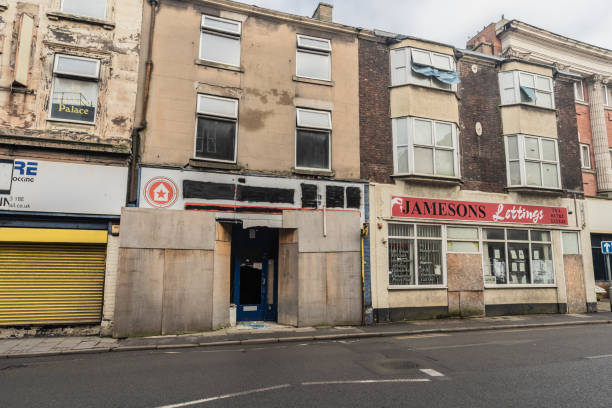How to Find Distressed Commercial Properties for Sale

Purchasing these properties involves thorough research, strategic planning, and an understanding of real estate market dynamics. Knowing where to look, what to evaluate, and how to negotiate effectively are critical skills for success. This guide will walk you through the key concepts, benefits, strategies, and steps involved in identifying and acquiring distressed commercial properties.
What Is a Distressed Commercial Property?
A distressed commercial property refers to real estate that is under financial strain, often due to the owner’s inability to meet mortgage obligations, poor property management, or significant physical deterioration. These properties may be in foreclosure, have delinquent taxes, or suffer from high vacancy rates. Distressed properties can include office buildings, retail spaces, warehouses, and multifamily units.
There are different types of distressed properties:
-
Foreclosed Properties: Properties repossessed by lenders due to non-payment.
-
REO (Real Estate Owned) Properties: Owned by banks after an unsuccessful foreclosure auction.
-
Short Sales: Sold for less than the mortgage owed, requiring lender approval.
-
Vacant or Abandoned Properties: Often neglected and may require significant repairs.
Benefits of Investing in Distressed Commercial Properties
Investing in distressed commercial properties offers several advantages:
-
Discounted Prices: Purchase properties below market value, increasing potential profit margins.
-
High ROI Potential: Renovations and improved management can significantly boost property value.
-
Tax Benefits: Potential deductions related to property improvements and losses.
-
Diverse Opportunities: Opportunities to invest in various commercial property types.
-
Equity Growth: Quick equity buildup through strategic improvements and effective management.
-
Less Competition: Fewer investors willing to take on the perceived risks, giving you an edge.

Tips on How to Find Distressed Commercial Real Estate
Here are several strategies to help you find distressed commercial properties:
-
Online Real Estate Platforms: Use websites specializing in distressed properties, foreclosures, and auctions. Sites like LoopNet, RealtyTrac, and Auction.com are valuable resources.
-
Public Records: Check foreclosure listings, tax delinquency records, and legal notices available at local courthouses or online.
-
Networking: Connect with real estate agents, attorneys, property managers, and other investors familiar with distressed properties. Attend real estate meetups and investment groups.
-
Driving for Dollars: Physically scouting neighborhoods for neglected, vacant, or poorly maintained properties can reveal hidden opportunities.
-
Real Estate Auctions: Attend local and online auctions where distressed commercial properties are sold, often at significant discounts.
-
Direct Marketing: Send targeted mail, emails, or make phone calls to property owners facing financial difficulties. Personalized outreach can uncover off-market deals.
-
Commercial MLS: Use the Multiple Listing Service (MLS) for commercial properties to identify potential distressed listings. Some properties may not explicitly state they are distressed, but signs like extended days on the market can be indicators.
-
Bank REO Departments: Contact banks’ real estate-owned (REO) departments to inquire about distressed properties they are looking to offload.
-
Wholesalers and Bird Dogs: Work with real estate wholesalers or bird dogs who specialize in finding distressed properties and bringing them to investors.
-
Court Auctions and Sheriff Sales: These legal proceedings often involve distressed properties being sold to satisfy debts, providing opportunities to acquire them at a discount.
-
Title Companies: Collaborate with title companies that have access to foreclosure filings and can provide leads on distressed properties.
-
Local Government Agencies: Some municipalities sell distressed properties through special programs to encourage redevelopment.
-
Social Media and Online Forums: Join real estate investment groups on platforms like LinkedIn, Facebook, and Bigger Pockets to find leads and connect with other investors.

Steps to Successfully Purchase a Distressed Commercial Property
-
Identify Potential Properties: Use the tips above to create a list of candidates that fit your investment criteria.
-
Conduct Due Diligence: Evaluate the property’s physical condition, financial performance, title status, zoning regulations, and any legal issues. Consider hiring professionals for inspections and appraisals.
-
Secure Financing: Arrange financing that suits distressed property investments, such as hard money loans, bridge loans, or private lenders. Traditional lenders may be hesitant with distressed properties.
-
Analyze the Investment: Calculate potential repair costs, expected rental income, and future resale value. Use key metrics like cap rate, cash-on-cash return, and ROI to assess profitability.
-
Negotiate the Deal: Work with experienced negotiators to get the best price. Be prepared to make quick decisions, especially in competitive markets.
-
Close the Deal: Ensure all legal and financial documents are thoroughly reviewed. Engage with real estate attorneys to handle complex transactions.
-
Rehabilitate and Manage: Implement necessary renovations to improve the property’s value. Focus on cost-effective upgrades that offer high returns. Effective property management is crucial for maintaining profitability.
-
Exit Strategy: Decide whether to hold the property for rental income, refinance to pull out equity, or sell after adding value for a profit.
Common Challenges and How to Overcome Them
-
Hidden Costs: Always budget for unexpected repairs and legal fees.
-
Financing Issues: Build relationships with alternative lenders specializing in distressed properties.
-
Complex Negotiations: Work with experienced real estate professionals to navigate complicated deals.
-
Legal Complications: Consult with real estate attorneys to address title issues, liens, or disputes.
-
Tenant Issues: If the property has existing tenants, ensure leases are reviewed and understand your rights and obligations as the new owner.

Conclusion
Investing in distressed commercial properties can be a rewarding journey if approached with the right knowledge and strategies. Dwanderful, led by real estate investor and podcast host Dwan, offers valuable resources to guide you. Take advantage of their free book, Real Estate Lingo, and explore the paid guide, Five Pillars of Real Estate Investing. Plus, discover your potential to generate six figures in the next six months with their quick quiz game—whether you’re buying your first property or your next, it takes less than a minute to find out!
Dwanderful provides insights, educational materials, and tools to help investors thrive in the real estate market. By leveraging their resources, you can build a successful portfolio, avoid common pitfalls, and maximize your investment potential. Contact us now!
Frequently Asked Questions:
What is the best site to find distressed properties?
Some of the best sites include LoopNet, Auction.com, RealtyTrac, and public records from county offices. Additionally, contacting local banks for REO properties and attending real estate auctions can yield great opportunities.
How to do a market analysis for a commercial property?
Conduct a market analysis by evaluating comparable properties (comps), analyzing local market trends, assessing rental income potential, and considering economic indicators in the area. Look at factors like vacancy rates, demographic trends, and future development plans.
What is the cash flow of commercial real estate?
Cash flow in commercial real estate refers to the net income generated from the property after deducting operating expenses, debt payments, and other costs. Positive cash flow indicates profitability, while negative cash flow suggests the property is not generating enough income to cover expenses.


